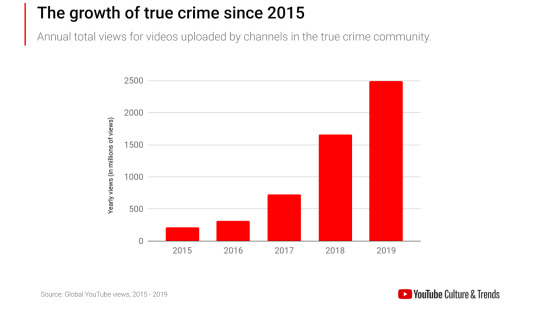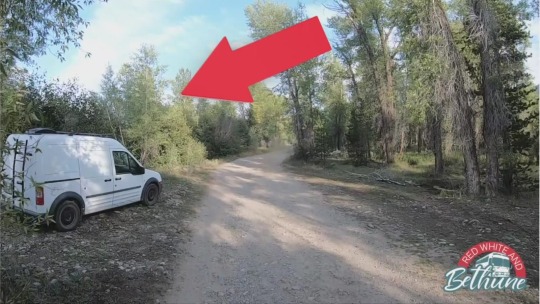This is where I will post my midterm and final blogs for Texas A&M's class, COMM-476 (Advanced Social Media). Thanks for reading!
Don't wanna be here? Send us removal request.
Text
The Intersection of True Crime & Social Media: When Does It Go Too Far?
By: Kayla Downing
Introduction
It is human nature to be fascinated by the macabre and the truly horrifying. Most people when they see a car accident on the side of the highway will slow down to observe the crash and comment on the aftermath. I think this translates into the modern fascination with true crime. True crime, as defined by the Cambridge Dictionary, are books, movies, podcasts, documentaries, etcetera about real crimes that happened to real people. The most “popular” genre of true crime tends to revolve around serial killers, gruesome murders, or kidnappings and torturings. True crime as a genre was brought to fruition in 1966 with the publication of Truman Capote’s In Cold Blood, however the genre stayed relatively obscure until the late 2010’s. True crime in recent years has become a common fascination, especially among young adult & teenage women. There are countless communities online dedicated to the dissection of true crime cases, specifically on Twitter (personal note: I understand that the name of the platform is now “X”, however, I will still most likely be calling it Twitter throughout this post) and TikTok.
Since 2018, true crime has seen an even larger spike in popularity, and during the pandemic the genre skyrocketed. YouTube videos on the genre saw a large uptick in views, and in 2019 it only grew larger. Channels like Bailey Sarian and her segment “Murder, Mystery & Makeup” or Buzzfeed Unsolved have been pioneers in the genre gaining popularity, especially within the young adult & teenage women audience.

So, why has this genre become so popular? What is so appealing about it, especially to women? What is the effect of this genre gaining popularity, on the families of the victims as well as those who are now investing in the genre? Within this blog post, I want to look at the Gabby Petito case (a very well documented murder case of how social media can affect murder investigations), the social media response surrounding the release of the Ted Bundy movie starring Zac Efron Extremely Wicked, Shockingly Evil, and Vile, and end out by understanding how this fascination with the genre affects our empathy and how it affects those who are closely related to those true crime cases.
The TikTok Hunt for Gabby Petito
Gabby Petito, a 22-year-old TikToker, was about to go on a cross-country roadtrip with her fiancé in their RV when she went missing around the end of August 2021. Her fiancé, Brian Laundrie, eventually returned to their shared home in early September without Gabby, disappearing off the grid two weeks later, and causing a widespread hunt for Laundrie and search for Gabby. People quickly pointed the finger at Laundrie, and all over social media people were desperate for clues to his whereabouts to bring him to justice for what was, at the time, the supposed murder of Gabby Petito. Eventually, authorities were able to find the remains of both individuals and rule their causes of death: strangulation for Gabby, and suicide for Laundrie. From there, the public widely considered Laundrie to be the cause of Gabby’s death, and that he had committed suicide to save himself from the guilt and backlash.
While this case is extremely tragic in a lot of ways, something that can’t be understated is how much social media played a role in it, for better or for worse. It is through TikTok that investigators were able to find the RV that Gabby and Laundrie had been traveling in, as a couple combed through their own video footage of their bus road trip to find the last known location of Gabby’s RV. This was instrumental in being able to find her remains and then eventually rule her cause of death as a homicide.

However, there were also massive downsides and setbacks associated with the public’s fascination and obsession with the Gabby Petito case. People were claiming false sightings of the couple, or spreading viral theories about what could have happened. While the police and FBI never outright spoke on whether or not these impeded their investigations, it seems in poor taste to use the murder of a girl to go viral on TikTok.
Doing things like that can separate the person from the case, and lower the empathy towards the people who are legitimately suffering because of this; it draws them into the limelight on an extremely sensitive and hurtful topic, all because people want to get a couple million views on their videos.
The biggest thing, in my opinion, that people fail to remember when these large cases go viral is that they’re real people, not fictional. False accusations on social media have very impactful consequences, and false theories can spread misinformation that’s potentially harmful to more than just the direct parties. In this case, spreading rumors about sightings of both Laundrie and Gabby could have led the police and the FBI in the wrong direction for their investigation. There are also adverse effects for the family members, as they are now thrust into the limelight over something that’s truly tragic.
The Response to Extremely Wicked, Shockingly Evil, and Vile
Gabby Petito’s case is one of many examples of the desensitization to true crime through social media. Just recently, Netflix released their documentary series on the murderer Alex Murdagh only two weeks before the trial jury reached a consensus. It’s things like this that push our empathy out of our minds; after all, isn’t the psychology of a killer inherently interesting? But these documentaries don’t take into consideration the feelings of the victims. For instance, the creators of Netflix’s series on Jeffrey Dahmer didn’t reach out to any of the families of the victims for consent to create the show. A similar case happened with the release of their movie on Ted Bundy, Extremely Wicked, Shockingly Evil, and Vile, which covered the Ted Bundy murders from the perspective of his longtime girlfriend, Liz.
This movie had seen its fair share of backlash upon and before release in 2019. When the movie was first announced, the casting of Zac Efron as Ted Bundy generated very controversial discussions. People felt it was “truthful” to the reality of the situation, as is commonly known from the court trial that people would proclaim Bundy’s innocence due to his attractiveness, and others called it insensitive to the families of the victims.

While perhaps the casting of Zac Efron wasn’t the smartest choice on Netflix’s part, it did create a lot of attention surrounding the movie, and therefore, the subject matter. People took to even calling Ted Bundy attractive and, from there, it was revealed that there even fan accounts dedicated to Ted Bundy, specifically on Twitter.

People began to put Ted Bundy on such a pedestal; saying enough things about him being attractive that even Netflix had to release a statement about the things everyone was saying. All in all, it was a very telling reaction to the general public’s view on true crime and how desensitized to the truly violent acts they are.

Social Media's Role in True Crime Desensitization
So, with all this being said, how does social media specifically play a role in the desensitizing of true crime & violent content to the greater public? Social media encourages the idea of marketing it as content (shows like “Cookies & Crime” or theory videos on people like Gabby Petito) rather than impactful news. When people watch a TikTok of a woman decorating a tombstone cookie while detailing the gruesome murders of a family, people aren’t registering the truly violent and, well, wicked things they’re hearing. Presenting the content in this manner does little to convey how dangerous, upsetting, and disturbing these cases are. True crime documentaries also exist at an all-time demand, especially post-pandemic where people found themselves scrounging for things to watch to keep them occupied. True crime podcasts consistently reign amongst the most popular podcasts, and new ones seem to pop up almost every week.

This subject matter, as gruesome it may be, honestly does interest me to some extent (more or less, the fascination other people seem to have with true crime). When I was first starting college, I also wanted to potentially pursue a career in crime (I wanted to be a criminal psychologist) but in my sophomore year, I switched to communication. A large part of why I switched was because the biggest reason for me wanting to go into that major was the glorification of criminal profilers and criminal psychologists through social media or shows like CSI and Law & Order. So, at one point in time, I felt the exact same fascination that most other women do with true crime – and that’s another thing; why do so many women love the true crime genre?
In my opinion, it’s because the young adult and teenage women are the prime demographic that most serial killers tend to target. While obviously there are cases like John Wayne Gacy or Jeffrey Dahmer who primarily target young men & boys, the large majority tend to target women. I think there’s also a fascination with understanding the mindset and motivations behind “psychopaths” or “sociopaths”. What drives them to want to torture? To maim? To kill? It’s questions that will hardly ever get truthful answers, and social media provides the perfect platform to build theories and communicate with other true crime fans to find out their own theories. It’s a vicious cycle that will probably always continue, and it’s one that (in my opinion) creates a want to be in the spotlight for these things.
More often than not, people are more likely to be able to list the names of countless serial killers, kidnappers, and torturers. Those same people likely cannot begin to name one of the victims of those terrible people. That’s in large effect due to the media's obsession with those who commit the crimes rather than those who have suffered; after all, where’s the newsworthiness in talking about the life of a woman or man who suffered? School shootings produce exposés and biographies on the shooters, while the victims get little more than a passing remembrance after the initial newsbreak.
Conclusion
I know that this blog may seem a little all over the place, but I’m hoping the spirit of my message can still be heard and understood. In my opinion, news media & social media are big reasons why true crime shot up in popularity and why so many people have become “obsessed” with the genre and have a morbid fascination with the subject matter.
I’d like to close this out by talking about the initial question posed in the title: when does this go too far? For me, it’s when the lines get blurred between understanding that these people are real and wanting to make content.
There is a need, especially in this day and age, to go viral by any means necessary, whether good or bad. People will lie about facial features (a la “Scar Girl” on TikTok), diseases (ticsandroses, who infamously faked having Tourette’s, or the countless young teens who seem to be faking Dissociative Identity Disorder), and more just to boost their view count. Controversy creates more talk and views than almost anything else, and true crime is one of the most controversial subject matters out there. Decorating and icing cookies as you touch on gruesome murders is, inherently, controversial; at its core, it’s dehumanizing the content in a way that it becomes hard to understand and appreciate the gravity of the situation. Those videos are filled with countless comments of things like “I love this case!” or “this content is so gross”; from there, people will share it with their friends to discuss, and at that point, the subject matter isn’t even entirely relevant to the conversation.
I think cases like Gabby Petito are a rare example of how social media can do good rather than harm in current true crime cases. There’s a term that was thrown around a lot during my research of “armchair detective”, in which people will sit from the comfort of their homes and try to solve violent crimes using tools available through social media. They will comb through post histories, playlists, anything they can get their hands on to (1) create theories on what could happened and (2) create viral content on these theories to generate either actual awareness on the issue (as I find, this happens rarely) or spark some type of debate. Armchair detectives normally do more harm than good in those situations as they can disseminate potentially harmful falsities that can impede an investigation (like what likely happened with Gabby Petito). However, it was these types of true crime fans that were able to identify where Gabby’s RV was and then help investigators locate her remains; it’s an extremely double-edged sword.
While I doubt that there’s anything I can really do to find or create a solution to stop this problem, I’d like to do what I can to bring attention to it. This is something I feel about deeply, especially considering I used to be someone who was really into and would consider themselves obsessive about true crime or serial killers. This type of content, and creating content specifically to go viral off of it, is harmful with really no way of changing it. Very rarely do these videos give spotlight to the victims. Beyond that, most families of the victims wish for nothing more than these types of stories to lose their traction and fade away. I can’t even begin to imagine how it must feel, as a family member of someone whom Ted Bundy killed, to see people idolize him and proclaim his innocence. Or how it must feel to see new documentary after film after TV show detailing who he was, how he murdered people, etcetera. As a whole, our society can do a lot better by these families, and I think we should. After all we’ve done to force the murderer of their daughter or son or sister or brother in their faces, I think it’s the least of what we owe them.
Bibliography
Bentley, L. (2023, March 31). The internet’s true crime obsession has gone too far. The Diamondback. https://dbknews.com/2023/03/31/internet-tiktok-true-crime-documentary-criminal-subculture/
Board, L. E. (2023, January 9). The rise of Social Media Crime Solvers. Grand Valley Lanthorn. https://lanthorn.com/95858/opinion/the-rise-of-social-media-crime-solvers/
Chu, A. (2021, September 20). Gabby Petito case: Tampa family spots White Camper Van in video - wtsp.com. WTSP. https://www.wtsp.com/article/news/special-reports/gabby-petito-case/tampa-family-gabby-petito-van-video/67-cb4ea49a-b778-4a5c-980b-4510a0b5ba84
Cross, B. (2023, February 25). The Dark Side of social media: How true crime content is trending. Cold Case Inc. https://coldcaseinc.com/the-dark-side-of-social-media-how-true-crime-content-is-trending/
Maxouris, C. (2022, January 21). A timeline of 22-year-old Gabby Petito’s case. CNN. https://www.cnn.com/2021/09/16/us/gabby-petito-timeline-missing-case/index.html
Sayles, J. (2021, July 9). The Bloody Bubble. The Ringer. https://www.theringer.com/tv/2021/7/9/22567381/true-crime-documentaries-boom-bubble-netflix-hbo
Whitehurst, L., & Licon, A. G. (2021, September 29). Gabby Petito story boosted by social media, true-crime craze. AP News. https://apnews.com/article/gabby-petito-social-media-tiktok-investigation-d2e9a5d627c2f39b5633174239c3beaf
1 note
·
View note